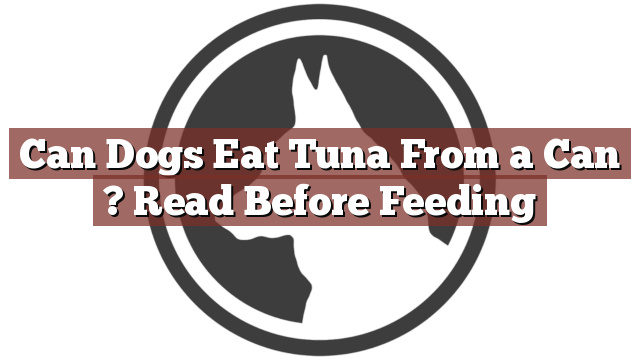Understanding Your Dog’s Dietary Needs
As responsible pet owners, it is essential to understand the dietary needs of our furry friends. Feeding them a balanced and nutritious diet is crucial for their overall health and well-being. Dogs require a diet that primarily consists of protein, fats, carbohydrates, vitamins, and minerals. While some human foods can be safely shared with dogs, it is important to be aware of what foods may not be suitable for their consumption.
Can Dogs Eat Tuna From a Can? Read Before Feeding
Can dogs eat tuna from a can? This is a common question that many dog owners have. The answer is yes, dogs can eat tuna from a can, but there are some important factors to consider before feeding it to your furry companion. Tuna is a good source of protein, omega-3 fatty acids, and essential nutrients, which can provide several health benefits for dogs. However, there are a few things you should keep in mind.
Pros and Cons of Feeding Tuna to Your Dog
Feeding tuna to your dog certainly has its benefits. Tuna is rich in high-quality protein, which is essential for maintaining strong muscles and supporting various bodily functions. Additionally, tuna is an excellent source of omega-3 fatty acids, which can promote healthy skin and a shiny coat. These fatty acids also have anti-inflammatory properties that can benefit dogs with arthritis or joint issues. Moreover, the omega-3s in tuna can support cognitive function and overall brain health in dogs.
On the other hand, there are some potential drawbacks to consider. Tuna, especially canned tuna, often contains high levels of mercury. This heavy metal can be toxic to dogs if consumed in large quantities over time. Furthermore, some canned tuna products may contain added ingredients such as salt or oil, which can be harmful to dogs in excessive amounts. It is crucial to choose a tuna brand that is low in sodium and does not contain any harmful additives.
In Conclusion: Considerations for Feeding Tuna to Your Dog
While dogs can eat tuna from a can, it is important to do so in moderation and with caution. Here are some key points to consider before feeding your dog tuna:
- Choose a low-sodium and additive-free tuna brand.
- Limit the amount of tuna you give to your dog to avoid excessive mercury consumption.
- Consider mixing tuna with your dog’s regular food to make it a small part of a balanced diet.
- Consult with your veterinarian before introducing tuna to your dog’s diet, especially if your dog has any pre-existing health conditions.
Remember, every dog is different, and what suits one may not be suitable for another. If you are unsure about feeding tuna to your dog or have any concerns, consult your veterinarian for personalized advice. Your vet can guide you on the right portion size and frequency of tuna consumption based on your dog’s individual needs and health status.
By being informed and making careful choices, you can ensure that your furry friend enjoys the occasional tuna treat while maintaining a healthy and balanced diet.
Thank you for taking the time to read through our exploration of [page_title]. As every dog lover knows, our furry friends have unique dietary needs and responses, often varying from one canine to another. This is why it's paramount to approach any changes in their diet with caution and knowledge.
Before introducing any new treats or making alterations to your dog's diet based on our insights, it's crucial to consult with a veterinarian about [page_title]. Their expertise ensures that the choices you make are well-suited to your particular pet's health and well-being.
Even seemingly harmless foods can sometimes lead to allergic reactions or digestive issues, which is why monitoring your dog after introducing any new food item is essential.
The content provided here on [page_title] is crafted with care, thorough research, and a genuine love for dogs. Nevertheless, it serves as a general guideline and should not be considered a substitute for professional veterinary advice.
Always prioritize the expert insights of your veterinarian, and remember that the health and happiness of your furry companion come first.
May your journey with your pet continue to be filled with joy, love, and safe culinary adventures. Happy reading, and even happier snacking for your canine friend!

